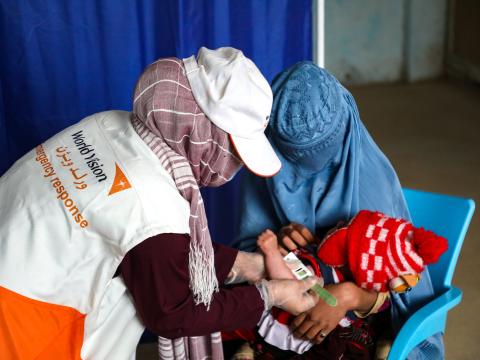World Vision Afghanistan Redeclares CAT III Sustained Humanitarian Response

Kabul, Afghanistan – World Vision Afghanistan has redeclared its CAT III Sustained Humanitarian Response (SHR) to continue supporting the country’s most vulnerable children, as humanitarian needs have remained high since the international withdrawal in 2021.
“Humanitarian assistance to Afghanistan has prevented some of the predicted worst-case scenarios, but the number of children in need remains staggeringly high,” said Thamindri De Silva, National Director, World Vision Afghanistan. “Lifesaving aid is essential, but it alone cannot address the root causes of suffering. We need sustained engagement, yet donor support often prioritises short-term interventions over long-term solutions. Children here remain among the most at-risk in the world.”
Afghanistan faces the compounded legacy of decades of conflict, economic collapse, the freezing of international funds, as well as complex governance challenges. This has fuelled widespread hunger, malnutrition, lack of basic services, protection risks, and ill-health. Climate shocks, displacement, and forced returns from Iran and Pakistan intensify the crisis. Millions of children are acutely malnourished, lack adequate diets, and face risks such as child labour and early marriage.
Since August 2021, World Vision Afghanistan has supported over 6,2 million people, including nearly 4 million children, delivering lifesaving aid and addressing gaps in access to clean water, education, and protection. Yet humanitarian needs remain staggering, with nearly 23 million people in need in 2025. Funding shortfalls and global attention elsewhere have widened the gap between those in need and those reached by aid.
World Vision Afghanistan’s SHR combines relief, support for basic human needs, and advocacy to ensure that humanitarian support goes beyond emergency aid. Key priorities include:
- Embedding nutrition outcomes across new projects, ensuring children’s adequate nutrition remains central to World Vision Afghanistan’s work, and influencing other implementers and decision-makers.
- Supporting children and communities to meet basic needs through principled engagement with authorities, delivering impartial, transparent, and standards-based assistance.
- Providing multi-sectoral support in drought-affected provinces (Herat, Badghis, Ghor, Faryab) and to Afghan returnees, addressing urgent needs, strengthening protection, building resilience, and promoting sustainable recovery while preventing the escalation of unmet needs.
- Applying World Vision’s new WASH business plan to mitigate the effects of inadequate clean water – disease, displacement, lost education, and livelihoods.
- Partnering with local actors to expand capacity and foster more locally led responses to entrenched needs.
- Investing in alternative education models, especially early childhood development, to reach marginalised children, and promoting life-skills training for excluded groups.
- Enhancing community decision-making and participation.
- Advocating with decision-makers for cross-ministry, multi-sector humanitarian responses and amplifying the voices of at-risk Afghan children in shaping policies and programmes.
World Vision Afghanistan’s 2026–2030 strategy aims to ensure that more Afghan children have access to adequate food, essential services, and protection, helping them survive, adapt, and thrive amid persistent crises. World Vision continues to prioritise lifesaving humanitarian work, while also advocating for long-term solutions to drivers of poverty and vulnerability.
“We call on the international community for continued support, both financial and technical, to safeguard children’s wellbeing, protect their rights, and enable a pathway towards sustainable recovery,” De Silva added.
Media Contact:
World Vision Afghanistan Communications
Mark Calder, Advocacy, Policy and Communications Director, World Vision Afghanistan: Tel +44 (0) 7877 243509; email: mark_calder@wvi.org